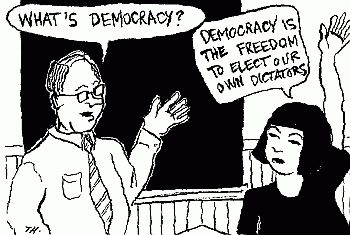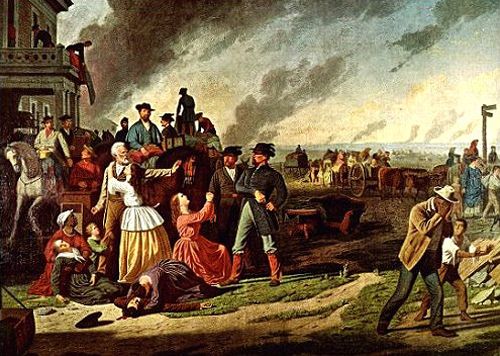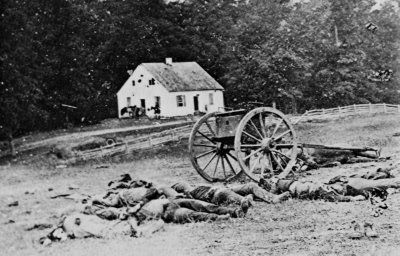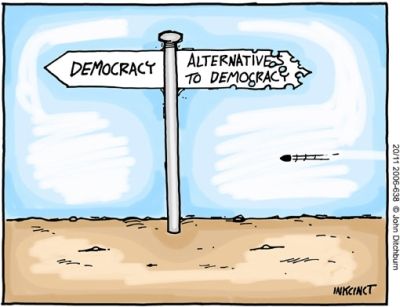
Publisher:
Bonnie King
CONTACT:
Newsroom@Salem-news.com
Advertising:
Adsales@Salem-news.com

~Truth~
~Justice~
~Peace~
TJP
Oct-16-2010 16:20

 TweetFollow @OregonNews
TweetFollow @OregonNews
Democracy and its Discontents
Ersun Warncke Salem-News.comIf consent and consensus are the hallmarks of democracy then Hitler’s Germany and Hirohito’s Japan are likely two of the most democratic societies ever created.
 Courtesy: desertpeace.wordpress.com |
(EUGENE, Ore.) - The state of American democracy is often bemoaned in political discourse. The common refrain amongst all pundits, from the Tea Party to the New York Times, is that all of the problems in government result from a deficiency in the democratic process.
If only politicians would follow the will of the people, it is said, the ship of state would be set aright and put to its proper course.
Proponents of democracy as a magical elixir capable of solving all social ills never give any evidence or rational argument for why this should be the case. In fact, they ignore a practically unanimous body of historical record which directly contradicts their claims.
The most poignant example of deluded democratizers in recent times are those fine people who insisted that invading other countries, and forcing them at gun point to hold elections, would magically transform both them and their societies.
Although it may be premature after only a decade to declare this effort a failure, there is good reason to believe that it ultimately will be.
The right wing democracy fanatics are echoed on the left by Noam Chomsky who asserts over and over in various formulations that “every social change in history has come from concerted organized public action. It was never given by a gift from above.”
Chomsky is unquestionably wrong. Many of the greatest social changes in history have been wrought by small groups of revolutionaries led by absolute rulers.
Castro in Cuba, Hitler in Germany, and Lenin and Stalin in Russia, are but a few examples of the dozens that can be found in the last century alone.
The Norman Conquest of England in 1066, the most famous social upheaval in English history, is a more ancient example. William Duke of Normandy conquered England, population estimated to be 1.1 million, with 8,400 troops.
How is it that the blind adherents to democracy as a vehicle for social change ignore these seemingly monumental counter examples to their arguments?
I can only assume that such ignorance must be supported by a moral judgment that all social change enacted by absolute rulers is wrong. Disregarding the veracity of this moral proposition, it is worth noting that in terms of actual effect, social change enacted by absolute rulers appears to be far more prevalent in history than social change born of mass democratic consensus.
Is all social change enacted by absolute rulers wrong?
The greatest social change in the history of the United States was the abolition of slavery. This came about when Abraham Lincoln assumed absolute power, and in essence abolished the Constitution, in order to make war on the slave states.
Of course, at that time the Democrats were the slaveholders, so perhaps that says something about the relationship between democracy and social change. In any case, you cannot have it both ways: either slavery should have remained or social change led by absolute rulers is not always evil.
It is important to point out here that the United States Constitution formulated the government as a Presidential Republic, which is more or less a euphemism for Constitutional Monarchy. It should be noted that when the Constitutional Convention was convened in 1787 the leading voices who leaned toward populist democracy, Thomas Jefferson, Patrick Henry, and Samuel Adams, were excluded.
The framers of the Constitution famously sought to create a balanced government that incorporated elements of both a monarchy and a republic. This course of action reflected the understanding of social class and social organization that prevailed at the time.
A monarch is nothing more than a tribal chief. It is a position of power that is rooted in leadership of the tribe which gave way to leadership of a family. Every monarch, going back to Roman Emperors, has been the head of a powerful family or tribe. Their rule is extended over a larger group by the dominance of their family over competing families.
A republic is a compact between powerful families in which they agree to share decision making authority in order to prevent any one family from achieving dominance over them all.
The weakness of republics lies in the fact that their power is derived from ownership of land which necessarily implies subjugation of a large underclass of slaves, serfs, peasants, etc, who must be pressed into the role of performing labor and paying rent to the land owners.
A strong republic implies an increasing disproportion in wealth between land owners and the landless, which is an inevitable destabilizing force.
The progressive diminution and debasement of the landless class makes them ripe for incitement, which in turn leads to the emergence from one of the ruling families of a leader who can unite the landless in order to wage war on the other land owning families and establish a monarchy.
The undulation between republics and monarchies had occurred with sufficient regularity over the course of history that by the time the U.S. Constitution was being written its framers understood the fundamental causes of these upheavals well and sought to guard against them.
On the one hand, a monarchical position was created, which was designed as a safeguard against the rise of any competing monarch. On the other hand, an elaborate republican system was created to control this monarch and prevent them from gaining absolute power.
However, this system did not address the fundamental destabilizing force in government, which is the accumulation of land in the hands of a few, and the progressively growing level of discontent amongst the landless that must result from this situation.
Consequently, after a short time the fledgling U.S. Republic once again veered toward disaster, and the establishment of a true monarchy was required. In this case, I am referring to a true monarch as an absolute ruler who takes on the task of liquidating a portion of the land owning class and redistributing land in order to stabilize society.
As I stated earlier, the Civil War necessarily implied abolishing the Constitution, because it broke the compact between the land owning families that had created it.
The plain intent of this breach was for the ruling families of the North to make war against the ruling families of the South in order to liquidate their property holdings, redistribute their land, and forestall the growth of their land claims in the West.
Abraham Lincoln was well suited to the role of absolute monarch because he was an outsider with no powerful family to back him and no land holdings of his own.
The ruling families of the North could agree to appoint him as an absolute monarch because once his task was completed he could be discarded. Lincoln was only one man. When he was assassinated business as usual could resume without affecting the balance of power that had existed before he became an absolute ruler.
By contrast, if you take the example of ancient Rome, the assassination of Julius Caesar had no practical short term impact on the social structure of Rome.
Caesar’s power was fundamentally rooted in the power of the Julii family, which he had consolidated during his time as absolute ruler by liquidating competing families. Assassinating the head of a powerful family does nothing in the short term but hasten the succession of power within the family. A new head takes the place of the old but the fundamental strength of the family relative to competing families does not change.
The United States started out as a Presidential Republic, or Constitutional Monarchy depending on your terminological preference, and has become steadily more democratic over time.
Democracy has been called “rule by the mob” and the framers of the Constitution clearly dismissed this possibility out of hand. The great fallacy of democracy is that consent can make right wrong and true false.
No sane and reasonable person has ever taken democracy seriously as an organizing principle for government.
If consent and consensus are the hallmarks of democracy then Hitler’s Germany and Hirohito’s Japan are likely two of the most democratic societies ever created. No other examples of such a large proportion of a population being united in agreement on the right course of action come to mind.
I suppose the 88% of Americans who supported invading Afghanistan are another good example.
Historically, democracy has been used primarily as a prop to bolster weak arguments with the fallacious authority of majority support. In fact, majority support is completely meaningless, and sheds no light whatsoever on the credibility or desirability of any particular argument or course of action.
Where democracy can be useful is in delegating decision making authority within narrow predefined boundaries in order to allow participants to chose an outcome within those boundaries that is optimal for them.
This has the psychological effect of making participants believe that they have chosen the outcome for themselves, and thus results in them being more fully invested in the pursuit of that outcome.
Another important facet of the democratic process is that it is a way for rulers to solicit feedback from their subjects and adjust their policies accordingly based on this information. Rulers are genuinely concerned with the views of their subjects, at least to the point that it is necessary to maintain power. For this reason, democracy of some form has become a routine feature of most governments, even those with absolute rulers.
In the United States there are actually two systems of democracy. The first is the Constitutional Republic in which citizens cast votes. The second is “Market Democracy” or “Democratic Capitalism.” The Constitutional Republic is generally recognized. The later is not as well known.
Market Democracy is in theory a system where consumers vote for what they want with how they spend their money. This theory has be promulgated primarily in the corporate world.
Notably, in The Twilight of Sovereignty, Walter B. Wriston, former CEO of Citibank, promotes the idea that Market Democracy will eventually fully replace our Constitutional Republic.
Market Democracy imagines much narrower boundaries for democratic choice than those of our Constitutional Republic. In Market Democracy all significant policy is made in secrecy and by fiat.
Voters are given a fixed amount of money, based on their usefulness to the ruling class, and then they can choose between Sprint and ATT, McDonalds and Burger King, Citigroup and Wells Fargo, etc, when casting their votes.
The rise of Market Democracy has coincided with the general democratization of American society. While everybody is clamoring for democracy nobody is asking the crucial question of: what exactly is democracy good for anyway? The answer is: not much.
Huge corporate conglomerates, which are really governmental bodies unto themselves, are happy to give democracy to their supporters within the narrow confines that they have constructed.
They can then point to the thriving “democracy” they have created and demand that our Constitutional government bend to every fickle whim of the democratic mob that they have gathered. Our government, as it stands, is the result.
Far from having too little democracy, our current State and National governments are paralyzed by being overly democratic. The absurd and contradictory demands of the majority of the population are continually held up as arguments against making any substantive policy reforms.
In short, the people want unlimited wealth, eternal life, and nonstop entertainment. At the same time they don’t want to work, they don’t want to study, and they don’t want to be responsible for their own decisions.
If anything, our current government is a perfect representation of the democratic will of the majority of the people. It is arrogant, reckless, ignorant, and divisive. It spends money it doesn’t have, makes promises it can’t keep, and responds to all serious policy choices with denial and paralysis.
The solution to these problems is not more democracy. What is needed in government is representatives who will expressly make decisions that are contrary to the will of the majority of the population.
The majority of the population have exercised their vote, in Market Democracy, and what they have voted for is economic ruin and social collapse. However, this is a Constitutional Republic, not a democracy. What the mob wants is not an option, so it is incumbent on the minority to exercise their rights under our Constitutional government and overturn the will of the majority.
Remember when you vote on November 2 that democracy, as imagined by the Democratic Capitalists, is actually very un-American. We have a Constitutional system that is far superior to Market Democracy and unless we empower our representatives in government to make the hard decisions that are contrary to the democratic majority, Market Democracy actually will come to replace our Constitutional Republic.
 Salem-News.com Business/Economy Reporter Ersun Warncke is a native Oregonian. He has a degree in Economics from Portland State University and studied Law at University of Oregon. At a young age, his career spans a wide variety of fields, from fast food, to union labor, to computer programming. He has published works concerning economics, business, government, and media on blogs for several years. He currently works as an independent software designer specializing in web based applications, open source software, and peer-to-peer (P2P) applications.
Salem-News.com Business/Economy Reporter Ersun Warncke is a native Oregonian. He has a degree in Economics from Portland State University and studied Law at University of Oregon. At a young age, his career spans a wide variety of fields, from fast food, to union labor, to computer programming. He has published works concerning economics, business, government, and media on blogs for several years. He currently works as an independent software designer specializing in web based applications, open source software, and peer-to-peer (P2P) applications.
Ersun describes his writing as being "in the language of the boardroom from the perspective of the shop floor." He adds that "he has no education in journalism other than reading Hunter S. Thompson."
But along with life comes the real experience that indeed creates quality writers. Right now, every detail that can help the general public get ahead in life financially, is of paramount importance.
You can write to Ersun at: warncke@comcast.net
Articles for October 15, 2010 | Articles for October 16, 2010 | Articles for October 17, 2010
Quick Links
DINING
Willamette UniversityGoudy Commons Cafe
Dine on the Queen
Willamette Queen Sternwheeler
MUST SEE SALEM
Oregon Capitol ToursCapitol History Gateway
Willamette River Ride
Willamette Queen Sternwheeler
Historic Home Tours:
Deepwood Museum
The Bush House
Gaiety Hollow Garden
AUCTIONS - APPRAISALS
Auction Masters & AppraisalsCONSTRUCTION SERVICES
Roofing and ContractingSheridan, Ore.
ONLINE SHOPPING
Special Occasion DressesAdvertise with Salem-News
Contact:AdSales@Salem-News.com

googlec507860f6901db00.html



Terms of Service | Privacy Policy



All comments and messages are approved by people and self promotional links or unacceptable comments are denied.
twf October 17, 2010 7:48 pm (Pacific time)
Toussaint L’Ouverture is a prominent slave in the history of the slave trade. He rose up and fought the French oppressors. You can see a clip of his last moments in prison from the film “The Last Days of Toussaint L’Ouverture” – a short film – http://www.imdb.com/name/nm2468184/
M. Dennis Paul, Ph.D. October 17, 2010 12:49 am (Pacific time)
An interesting construct that overlooks significant realities regarding social change and representation. Historically, representatives vote against the will of the people and in favour of the economic will of the elite class. The will, if it can be called that, of the people is always subject to the degree to which they can comprehend a given issue. Comprehension comes slowly, if at all, where education is limited, information is hidden (or fabricated), and economic deprivation narrows ability to focus beyond survival. Positive social change (as opposed to the examples of change presented in this article)is subject to the hundredth monkey situation where a threshold of comprehension is reached in a given population and the people arise to the task of forcing change through resistant action as well as political deployment of progressive candidates. Human nature, however, most often takes, over time, a benign (as opposed to defensive) position toward positive changes won through the mechanisms of change. This relaxation of effort leaves wide a field for corruption and degradation of hard won change by the elite class. The failure of any organizational structure (government) rests on the sublimation of education, information and vigilance.
[Return to Top]©2025 Salem-News.com. All opinions expressed in this article are those of the author and do not necessarily reflect those of Salem-News.com.